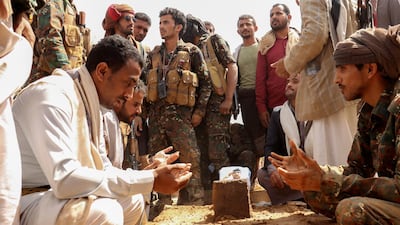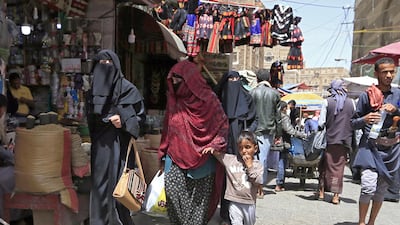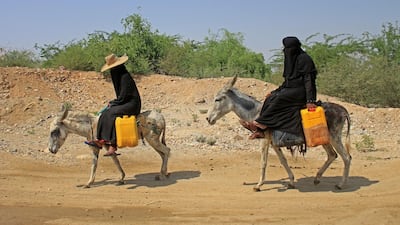Somewhere in Sanaa, Yemen, a young woman is secretly learning to play the violin. She has no hope of a public performance of her skills. The very act of a woman practicing an instrument is forbidden by the city's current rulers. People in touch with her say her family are aware of the enormous risk of punishment from the Houthi rebel group that controls the city.
Warnings that the situation in Yemen is spiralling into an ever-greater disaster have come thick and fast this week. That young woman's situation, relayed by an aid worker during a UK think tank panel, is by no means the most precarious in Yemen. But it is a demonstration of how far-reaching the misery triggered by the Houthis bid for hegemony across Yemen is.
A statement from four European countries and the US last week warned of the worrying implications of the Houthis ramping up their offensive against their opponents in Yemen. The foreign ministries condemned the “sustained” Houthi assualt on Marib city, and the group's major escalation of attacks against Saudi Arabia. “Their determined attack on Marib is worsening an already-dire humanitarian crisis,” the joint statement said.
A day later, Tim Lenderking, the new US envoy to Yemen, addressed a panel in Washington, in which he said that US aid supplies are soon to be made available once again across the whole country. The administration of former US president Donald Trump had banned such supplies in Houthi-controlled territory because of the taxes the group imposed on them and the other revenues it was siphoning. But Mr Lenderking said that supplies are now reaching Hodeida “consistently”, though the Houthis authorities in the port city continue to impede the delivery of critical aid and commercial imports.
The situation in Marib is critical to where the conflict goes now. All shades of expert opinion on Yemen agree that US President Joe Biden's big, early announcements on the Houthis and their backer Iran — the two cannot be disentangled in this instance — have emboldened the rebel group, which swept in to displace Yemen’s legitimate government in an insurrection in 2014.
Mr Biden's removal of the formal US designation of the Houthis as a terrorist group has certainly been noticed in Yemen, where fighting has gone into overdrive.
A new tilt on the part of the Houthis in favour of continued warfare has cast renewed uncertainty over the UN’s peace and power-sharing talks. UN diplomats have been attempting to breathe new life into a ceasefire previously outlined in UN Resolution 2216.
The current plan, a version of which has been leaked, is to produce a joint declaration between the parities. It lists a formidable set of issues for a preliminary deal. These include a ceasefire and monitoring forces deployed nationwide. It discusses revenues for the Marib Oil Company, salaries for Houthi civil servants and a stay on Houthi taxes on Hodeida-bound aid shipments. It also calls for a commitment to a new round of direct peace negotiations.
All of this feels detached from the circumstances on the ground within Yemen. Local communities are forced to cope as best as they can. One recent survey estimated that there were as many as 333 locally autonomous power centres within Yemen.
For the people who are risking their lives to make their own local area safer or more functional, international developments hold little promise.
The offensive on Marib threatens to bring Yemen to a new level of internecine warfare. The Houthi objective is to gain access to natural resource revenues from the areas outside the group's control. But it risks sacrificing one of the few stable areas of the country. Marib and its surroundings have absorbed 2 million internally displaced Yemenis, half of whom are families now living in camps.
The locals in Marib are ill-disposed to accepting Houthi rule. These are people who have been fighting and losing comrades or relatives to Houthi offensives over the past six years. If there was a Houthi takeover of the area, their resentment would not fall away.
Radical groups have been sidelined by counter-terrorism efforts within the area, supported from the city of Aden. Their appeal would surely spread as local communities sought to overcome the Houthi stranglehold.
As the Houthis move on to more oil-rich areas, they would then seek to complete their control with a push on Aden. From what we have seen in other parts of Yemen, it is clear the Houthi seek to install their local loyalists into power and leave them to enjoy the fruits of the group's conquest. Many experts believe the group's ability to dispatch its own people to govern other parts of the country is at its outer limit.
This model of governance does not offer traction with communities that are subject to Houthi reign. Polls show that Yemenis are consistently partial to the republican model of government they have been promised for decades, not a messianic regime like the one the Houthis have come to offer. The sectarian teachings in Houthi-run schools, on the airwaves and in propaganda from Sanaa have little appeal for the millions caught up in the conflict. Surveys of people show they are too preoccupied by basic needs including food, welfare, education and security at home.
Yemenis have proven resilient, as development assistance has disappeared and hardships increased. The Houthis' deeply ideological and loyalist systems aim to disrupt the myriad groups, especially those run by women, who continue to come together, deliver local humanitarian initiatives, take on teaching roles and look after those falling through the cracks.
Meanwhile the Houthis are rampant. Their Iranian allies see the group as a valuable card to play in their negotiations at minimal cost to Tehran and with little blowback potential, despite the suffering and losses in Yemen. The White House will have to work very hard to contain what has been set in motion in Yemen in just the past few weeks.
Damien McElroy is the London bureau chief at The National
















